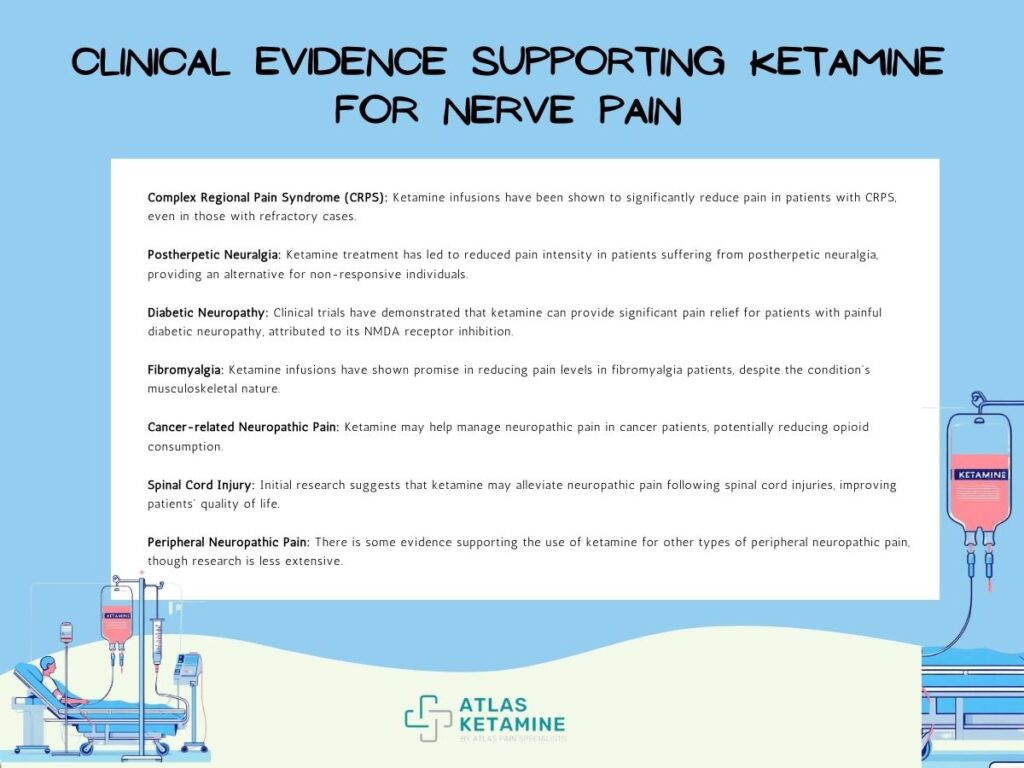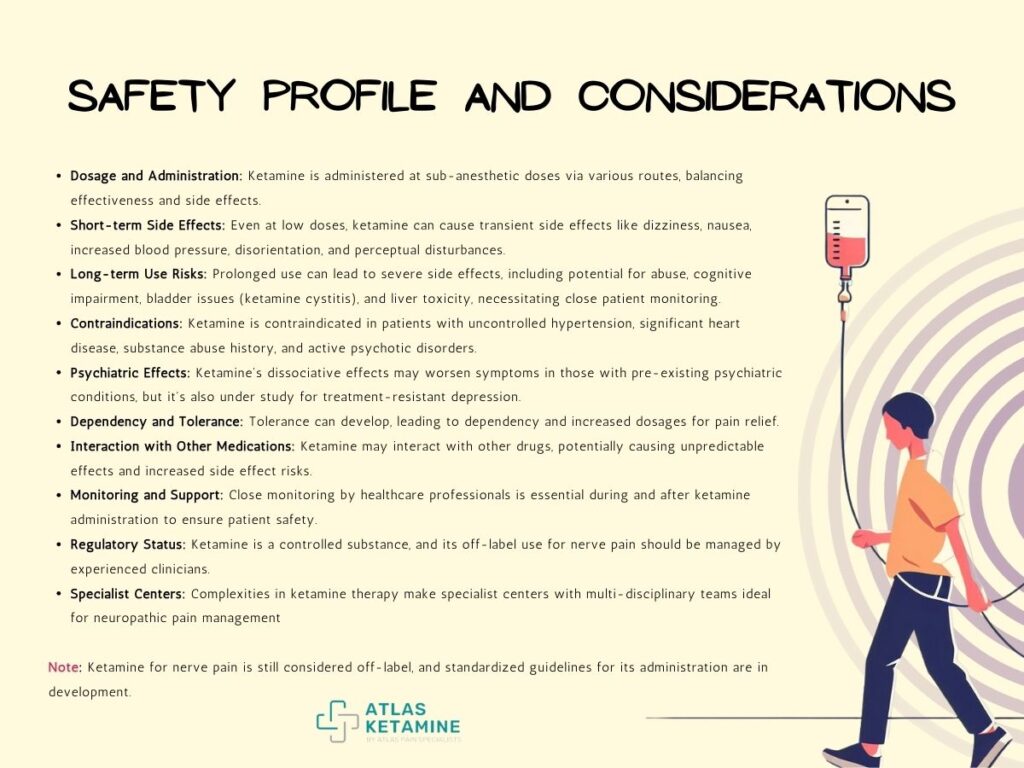Nerve pain, also known as neuropathic pain, can be one of the most intense and discomforting types of pain anyone can endure. Traditional pain management strategies sometimes fall short of providing relief for patients suffering from this debilitating condition.
This is where ketamine, a medication traditionally used for anesthesia, has emerged as a promising alternative for those with refractory nerve pain. In this article, we delve into how ketamine can work for nerve pain, its mechanisms of action, clinical evidence, safety profile, and the potential it holds for patients seeking respite from chronic neuropathic pain.
Understanding Nerve Pain
To appreciate how ketamine works for nerve pain, it's essential to understand what nerve pain is. Nerve pain, or neuropathic pain, differs from regular pain as it arises from the nerves themselves due to damage or dysfunction. This type of pain often manifests as a persistent burning, shooting, or stabbing sensation and may be accompanied by tingling, numbness, sensitivity to touch, and muscle weakness.
Common causes include:
- Diabetes
- Shingles
- Physical trauma
- Certain infections
- Autoimmune diseases
- Side effects from cancer treatments
The underlying mechanisms of nerve pain involve altered nerve function where damaged nerves misfire pain signals, central sensitization leading to an overreaction to pain signals, a loss of inhibitory signaling, which normally suppresses pain, and neuroplasticity where the nervous system adapts to a chronic state of pain.
Ketamine's Mechanism of Action
Ketamine is a dissociative anesthetic, which means it can create a state where the patient experiences a detachment from the environment and themselves at anesthetic doses. However, its pain-relieving properties at sub-anesthetic doses are of particular interest for treating nerve pain.
The drug's effectiveness in managing neuropathic pain stems from its action on the N-methyl-D-aspartate (NMDA) receptor in the brain. The NMDA receptor plays a pivotal role in modulating pain, and it's known that the overactivity of these receptors can contribute to the sensation of neuropathic pain.
Ketamine can prevent the brain from receiving excessive pain signals. Additionally, ketamine appears to reset some of the neural pathways that have been altered by chronic pain. It can also reduce inflammation and has antidepressant effects, which are beneficial as depression often accompanies chronic pain.
Clinical Evidence Supporting Ketamine for Nerve Pain
The clinical evidence for ketamine's effectiveness in treating nerve pain has been accumulating, with several studies and clinical trials underscoring its potential as a treatment option for various neuropathic pain conditions.
Key findings from clinical research include:

Complex Regional Pain Syndrome (CRPS)
Research has shown that ketamine infusions can lead to significant pain reduction in patients with CRPS, a debilitating chronic pain condition. A number of studies suggest that ketamine can reduce pain scores and may have lasting effects on pain relief, particularly in those with refractory CRPS.
Postherpetic Neuralgia
Patients suffering from postherpetic neuralgia, the pain following an outbreak of shingles, have reported reduced pain intensity following ketamine treatment. Studies indicate that low-dose ketamine infusions can alleviate symptoms, offering an alternative for those who do not respond to standard pain therapies.
Diabetic Neuropathy
Trials involving patients with painful diabetic neuropathy have demonstrated that ketamine can provide significant pain relief. The relief from pain is linked to ketamine's NMDA receptor inhibition, which is thought to play a role in the pain experienced by diabetic neuropathy patients.
Fibromyalgia
Although fibromyalgia is characterized by widespread musculoskeletal pain, it shares some pathophysiological features with neuropathic pain. Studies involving ketamine infusions for fibromyalgia patients have reported reductions in pain levels.
Cancer-related Neuropathic Pain
Ketamine has been studied in the context of pain management for cancer patients, including those with neuropathic pain due to the disease itself or as a side effect of chemotherapy. Some evidence suggests that ketamine may help reduce opioid consumption while managing pain levels effectively.
Spinal Cord Injury
Initial research has indicated that ketamine may help alleviate neuropathic pain following spinal cord injuries, potentially improving the quality of life for these patients.
Peripheral Neuropathic Pain
There is also some evidence that ketamine may benefit patients with other types of peripheral neuropathic pain, although research in this area is less extensive. While the evidence is promising, it is important to note that response to ketamine can be variable, and it may not work for everyone.
Furthermore, most of the studies conducted have been on a small scale or have lacked long-term follow-up to assess the duration of pain relief. Thus, more research is necessary to fully understand the optimal dosing, administration routes, and long-term efficacy and safety of ketamine for nerve pain.
Despite these limitations, the clinical evidence so far supports the consideration of ketamine as a potential treatment for patients with neuropathic pain, particularly for those who have not found relief with other treatments.
As with any emerging therapy, it's crucial for patients to discuss the potential risks and benefits of ketamine treatment with their healthcare providers.
Safety Profile and Considerations
Ketamine's safety profile and considerations for its use in treating nerve pain are multifaceted due to its history as both an anesthetic and a drug of abuse. When administered under medical supervision for neuropathic pain, ketamine is generally considered safe, but there are several important considerations:

Dosage and Administration
Ketamine used for nerve pain is typically administered at sub-anesthetic doses, either through intravenous infusion, subcutaneous injection, nasal spray, or oral routes. The dose is crucial; it must be high enough to be effective but low enough to minimize side effects.
Short-term Side Effects
Even at lower doses, ketamine can cause side effects such as dizziness, nausea, increased blood pressure and heart rate, disorientation, and perceptual disturbances (including hallucinations). These effects are generally transient and resolve after the drug is metabolized.
Long-term Use Risks
Long-term ketamine use can lead to more severe side effects, including potential for abuse, cognitive impairment, bladder and urinary tract issues (ketamine cystitis), and liver toxicity. These risks require careful monitoring of patients receiving ongoing ketamine treatment.
Contraindications
Ketamine is contraindicated in patients with uncontrolled hypertension, significant heart disease, or a history of substance abuse. It is also contraindicated in those with active psychotic disorders due to its psychoactive properties.
Psychiatric Effects
Because of its dissociative effects, there is a risk of exacerbating symptoms in individuals with pre-existing psychiatric conditions, although ketamine is also being studied for treatment-resistant depression.
Dependency and Tolerance
There is potential for developing tolerance to ketamine, necessitating higher doses to achieve the same pain relief, which can lead to dependency.
Interaction with Other Medications
Ketamine may interact with other medications, including CNS depressants and stimulants, which can lead to unpredictable effects and increased risk of side effects.
Monitoring and Support
Patients receiving ketamine for nerve pain should be closely monitored by healthcare professionals trained in its use. Vital signs, psychological status, and pain levels should be assessed during and after administration to ensure patient safety.
Regulatory Status
Ketamine is a controlled substance, and its off-label use for nerve pain should be prescribed and overseen by a clinician with experience in managing chronic pain and familiarity with ketamine's unique risk profile.
Specialist Centers
Given the complexities associated with ketamine therapy, treatment is often best conducted at specialist centers with multi-disciplinary teams capable of addressing the various aspects of neuropathic pain management and the potential side effects of ketamine.
It's important to note that while there is growing interest and application of ketamine for neuropathic pain, it is still considered an off-label use, and guidelines for its administration for nerve pain are not yet standardized.
The Future of Ketamine Therapy for Nerve Pain
The future of ketamine therapy for nerve pain is promising, focusing on personalization, innovative delivery methods, and combination treatments to enhance efficacy and reduce side effects. Advances in genomics may allow treatments tailored to individual genetic profiles, while new drug delivery systems could offer more controlled dosing.
Research into combining ketamine with other therapies and neuromodulation techniques could yield synergistic benefits. Identifying predictive biomarkers can help select patients likely to benefit from ketamine, improving outcomes.
Ongoing studies will inform long-term safety and efficacy, potentially leading to regulatory changes and wider acceptance. Efforts to educate on ketamine's medical use may reduce stigma and standardize treatment.
Lastly, telemedicine advancements could increase accessibility and facilitate remote monitoring, broadening ketamine's availability for those suffering from nerve pain.
Conclusion
Ketamine offers hope for those suffering from nerve pain when traditional treatments have failed. Its unique mechanism of action and the clinical results observed so far suggest it can be a powerful tool in the pain management arsenal.
At Atlas Ketamine, we're committed to providing patients with access to innovative therapies like ketamine infusions in a safe, compassionate, and professional environment. By staying at the cutting edge of pain management research, we're helping to alleviate suffering and improve the quality of life for our patients dealing with nerve pain.
The journey to managing nerve pain is a personal one, and ketamine therapy could be a viable option for many. If you or a loved one is grappling with neuropathic pain and interested in learning more about ketamine treatments, visit us at Atlas Ketamine to explore your options and take the next step toward pain relief.
